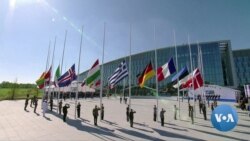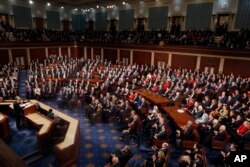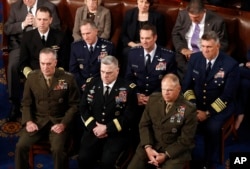Steve Herman, Cindy Saine and Valeria Jegisman contributed to this report.
WASHINGTON — NATO Secretary-General Jens Stoltenberg warned the U.S. Congress Wednesday of the threat of a "more assertive Russia," saying that the West's key military alliance is not looking to start a new Cold War with Moscow but needs to deter its military aggression.
In an unprecedented address to a joint session of Congress on the 70th anniversary of NATO's creation at the end of World War II, Stoltenberg also said the 29-nation North Atlantic Treaty Organization "has no intention of deploying land-based nuclear missiles in Europe." He accused Russia of violating the Intermediate-Range Nuclear Forces Treaty, which the U.S. says it is leaving because of Russian violations - a claim Russia has denied.
"We do not want to isolate Russia. We strive for a better relationship with Russia," Stoltenberg said. "But even with a better relationship, we still need to manage a difficult one."
He said, "NATO will always take the necessary steps to provide credible and effective deterrence."
WATCH: NATO Secretary General Warns US Congress of Challenges to Alliance
Stoltenberg called on NATO allies to spend more on defense, to meet the Western alliance's goal of each country spending at least 2 percent of the size of its national economy on defense by 2024, a standard only eight NATO countries currently meet.
Stoltenberg credited U.S. President Donald Trump, who once called NATO "obsolete," with pushing NATO countries to increase their defense spending and said, "It has had a real impact."
A two-time Norwegian prime minister, Stoltenberg acknowledged differences among the NATO countries on trade, energy, climate change and other issues, but said, "This is democracy. It's not a sign of weakness. It is a sign of strength."
House Speaker Nancy Pelosi and Senate Majority Leader Mitch McConnell invited the NATO leader to speak to members of the Democratic-controlled House and the Republican-controlled Senate to show bipartisan support from lawmakers in spite of Trump's ongoing criticism of NATO.
'Far from obsolete'
As foreign ministers of NATO gather in Washington, foreign policy analysts - and Stoltenberg in his address to Congress - are emphasizing it is one of the most successful military alliances in history and still relevant.
“NATO is adapting and allies are spending more on defense," Mark Simakovsky of the Atlantic Council told VOA. "And I think this (Trump) administration is understanding more and more how critical NATO is to some of the challenges that it faces, including China. So, in many ways, NATO is far from obsolete.”
Trump’s criticism that NATO members aren't spending the required 2 percent target, as well as political upheaval in Europe - including the impending British exit from the European Union - and calls by some to kick Turkey out of NATO, can leave the impression, however, that the defense alliance is fracturing.
“I don't think that's the case. The alliance is strong,” Estonian Defense Minister Juri Luik told VOA, pointing to increased political dialogues and military exercises among NATO’s members, as well as more U.S. military equipment and troops being brought to Europe.
“You're not giving the money to somebody else. You're not putting it into a NATO budget somewhere; you're spending it on yourselves," says McCain Institute executive director Kurt Volker, who formerly served as U.S. ambassador to NATO. “But it is a demonstration of your commitment to your own security, which then gives NATO the confidence that this is a country that we can help defend as well, because they are committed to defense of their own territory.”
Trump took credit Tuesday for pushing other NATO countries to spend more on defense, but criticized Germany, Europe's biggest economic power, for not doing more. Berlin now plans to spend 1.5 percent by 2024, missing the 2 percent NATO target.
Damaged trust
Others agree that defense spending is important, but they say the alliance is fundamentally about the members' ability to trust each other, and that Trump has damaged that trust.
"When an American president questions the value of the alliance, our enemies in Moscow and Beijing are now questioning whether or not NATO would come to the defense of some smaller NATO nations that the president has criticized as maybe not worthy of NATO's defense,” says Simakovsky, a former Europe/NATO chief of staff in the policy office of the U.S. secretary of defense. “But I don't think at this summit the administration is going to be announcing any departure of the United States.”
Brooking Institution’s Robert Kagan is expressing concern that Trump’s attitude toward the European Union and expressed hostility toward the defense alliance could bring more chaos to the continent.
“Think of Europe today as an unexploded bomb, its detonator intact and functional, its explosives still live. If this is an apt analogy, then Trump is a child with a hammer, gleefully and heedlessly pounding away. What could go wrong?” writes Kagan in a coming issue of Foreign Affairs magazine.








